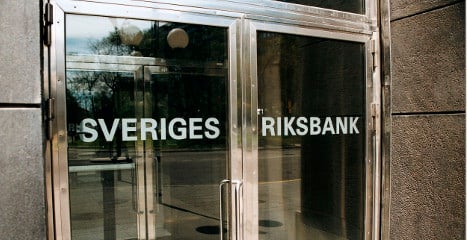The governor was unable to attend the April 19 monetary policy meeting of the executive board due to the volcanic ash cloud affecting flights after attending a meeting of EU finance ministers in Madrid.
“It was appropriate to leave the repo rate unchanged at 0.25 per cent at the latest monetary policy meeting in April,” Ingves wrote in a commentary published on Monday in the meeting’s minutes. “I also believe that the forecast for the repo rate was reasonable.”
He added, “I support the analysis in the Monetary Policy Update and the conclusions drawn concerning economic developments, the repo-rate decision and the repo-rate path. Against this general background, I will add a few comments here, but these do not change the conclusions in the Update.”
Ingves expects a return to global growth at a “good” level, which should lift the segments that are important to Sweden in global trade. However, he pointed out that Swedish economic policy must confront imbalanced global growth because the world is divided.
“Growth in Asia and South America is rapid, while the recovery is moving more slowly in the USA and Europe,” he wrote. “This will entail a prolonged recovery in Sweden as Swedish exports to the EU are substantial.”
Ingves noted that the outcome of the Greek financial crisis is uncertain, but Sweden will likely not be affected.
“This should not have any significant impact on Swedish monetary policy,” wrote Ingves. “Swedish banks have a very limited exposure to the Greek market and any market effects will probably be indirect.”
The governor also pointed out that conflicting forces are pulling the Swedish economy in different directions, with a strong service sector and an industrial sector experiencing a substantial fall in export demand.
“This makes it more difficult to analyse the situation, but I share the assessment, which we have also made earlier, that we are moving towards a sustainable economic recovery at the same time as inflation is moderate with well-anchored inflation expectations,” he wrote.
Ingves added Sweden has had extremely low interest rates for “a rather long time.”
“The financial markets are now more stable and the recovery of the Swedish economy is continuing,” he wrote. “I therefore think that the time is right to gradually phase out the special loans that the Riksbank has offered. It is appropriate to shorten the maturity of the loans offered at a variable rate and the fixed-rate loans will soon fall due.”
The governor said he does not believe the withdrawal of the Riksbank’s stimulus incentives will be particularly dramatic.
“If [the Financial Supervisory Authority] introduces restrictions regarding leverage levels for mortgages, this will also de facto have a tightening effect,” he wrote. “This is a reasonable measure from the consumer protection point of view, but also given the division we can now see on the credit market with a limited demand for loans in the corporate sector and a high demand for loans in the household sector.”



 Please whitelist us to continue reading.
Please whitelist us to continue reading.
Member comments